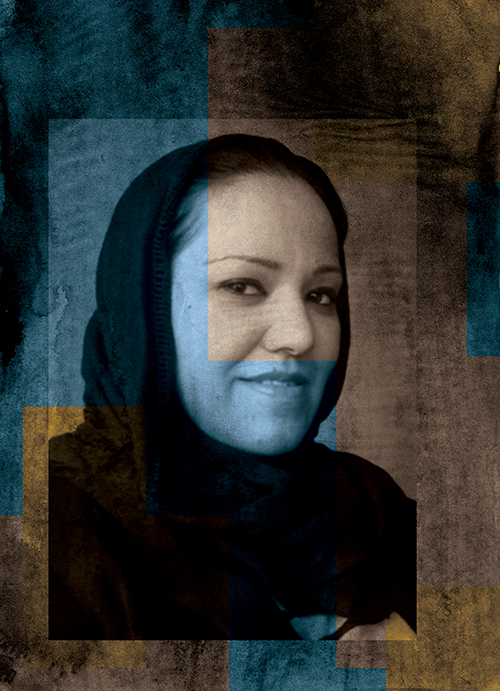Sonia Iqbal is the executive director and a shareholder of PAHNA Group (a Kabul-based communications and management firm) as well as the president of Afghanistan 1400 Party, a civic-political youth organisation. She obtained her BA in Peace Studies and International Politics from the US and her MA in Political, Economic and Social Developments after the War from Great Britain.
Have your rights ever been violated, and if so, how did it affect your life?
I remember being in school and hearing the sounds of blindly-fired rockets for half an hour at a time. In 1994, our family was forced to migrate to Pakistan. It was the most difficult decision of our lives. It was February and we had witnessed 40 successive days of war in the Parwan district where we lived. We had no electricity and burned whatever we had in the house to keep us warm. The situation in which we were forced to leave was so critical that we did not even have the briefest opportunity to go out and buy food to take with us.
What are the major achievements since the fall of the Taliban?
In 2001, we had fewer than one million school students; now, we have more than 10 million. Another achievement is freedom of expression. The availability of numerous media has given people access to first-hand information. Opportunities for women’s participation and women’s empowerment in the society have created hope for a change in the attitude amongst the new generation. Hopefully, we will see an evolution from the traditional role seen for women to something more reflective of the modern era. Access to education has also been critical in our time.
What are the biggest challenges facing Afghanistan?
First, the absence of proper management in the government. Other challenges are insecurity and the dependent economy. We do not have robust economic infrastructure; 80% of our budget comes from foreign aid. International statistics indicate that we will have around 400,000 to 500,000 unemployed people after the withdrawal of the international forces and a fall in foreign aid. Unfortunately, we have not planned for economic recession, but it is sitting on our doorstep.
Would today’s Afghanistan allow schools to once again be closed to girls and women to be excluded from social participation?
I do not think that Afghanistan will allow this, because 60% of today’s population is below the age of 25. This new generation has experienced relative stability and observed the achievements that it brings in practice.
However, there are less extreme situations than this, that are repeated so often that they stop being regarded as violations of human rights. Let me give an example. One of my close friends has a daughter who is in the 11th grade at school. Her parents are both educated people. Recently, I heard that they had arranged for their daughter to be married. I expected the daughter would be very upset, but noticed with great surprise that she had no problem with it and had not even resisted. The thing that makes the saddest in this whole story is how clearly it reveals this backwards undercurrent in our society. Even amongst the educated people, there is a widespread belief that women should only participate in a limited way in our society.
Which factors deter women from participating in social, economic, political and cultural spheres?
Women are facing employment insecurity, unhealthy work environments, and harassment on the street. All of these factors create a practice of self-censorship by women in order to protect themselves, which limits their participation at work.
Politics is also a completely male-dominated world. We do not see women in political equations.
What do women want?
They want to see the passage of the Law for the Elimination of Violence against Women by the Parliament. Secondly, women must have a role in the peace talks. Finally, women must be able to participate in government and politics.
Which sources and centres of power can women rely on to promote their rights and demands?
We do not have any source on which women can rely. The restrictions imposed by the government and the restrictive and closed-minded attitudes present in society have rendered the institutions that should do this job inefficient. In my opinion, the governmental systems must develop programmes for women to ensure their rights and demands are respected and achieved.
What do you wish for your daughter?
I wish for all girls to be able to think, and to feel it is their place to do so.
What have you done in your personal and professional life to fight against discrimination?
I focus mainly on empowerment of women. I took major steps as the president of a political party and director of PAHNA Group. I wanted to offer a new image of women to men and young people. One of the goals of Afghanistan 1400 is to lay the groundwork for women to participate in all fields, in particular in regard to political participation and gender equality in politics.
Do you have a specific message to share?
I ask the people to go to the ballot box. This shows the support of the people of Afghanistan for democracy and progress.
“Unveiling Afghanistan, the Unheard Voices of Progress” is a campaign by Armanshahr and FIDH, which explores views held by Afghan civil society actors. Over 50 days, 50 influential social, political, and cultural actors hope to spark conversation and debate about building a society that is inclusive of women’s and human rights in Afghanistan.
Follow 50 interviews drawn from the “Unveiling Afghanistan campaign” daily on the Huffington Post. Follow Unveiling Afghanistan on FIDH Twitter: www.twitter.com/fidh_en


